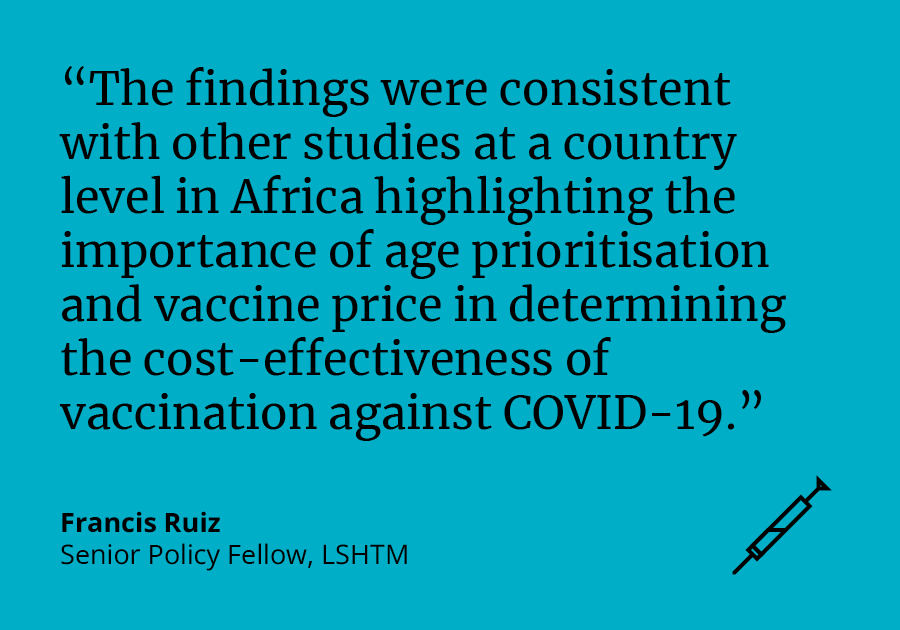
COVID-19 vaccination in Nigeria is cost-effective and could provide substantial health benefits according to new analysis published in PLoS Global Public Health.
Viral vector vaccines, such as those produced by AstraZeneca and Johnson & Johnson, represent a more cost-effective choice within the context of Nigeria, particularly when targeting older adults. Despite higher efficacy, vaccines employing mRNA technologies, like those produced by Pfizer and Moderna, are less cost-effective within the same setting due to high dose prices.
The study team included researchers from the Global Health Economics Centre (GHECO) and the Centre for Mathematical Modelling of Infectious Diseases (CMMID) at the London School of Hygiene & Tropical Medicine (LSHTM); and the University of Nigeria Nsukka, Nigeria.
Nigerian policy makers and decision authorities, including the Federal Ministry of Health, set out three policy questions which the research team aimed to address through the study: What type of vaccine should be purchased (i.e. viral vector vaccines or mRNA vaccines); how should vaccines be delivered (i.e., via health facilities, campaigns or targeted campaigns); and who should be prioritised?
Francis Ruiz, Senior Policy Fellow at the London School of Hygiene & Tropical Medicine, who co-led the research, said: “The findings from our combined economic and epidemiological analysis were consistent with other studies at a country level in Africa highlighting the importance of age prioritisation and vaccine price in determining the cost-effectiveness of vaccination against COVID-19.”
The researchers compared various vaccine scenarios reflecting different vaccine types, delivery platforms and age groups to no vaccination, delivered over a one-year period.
The study combined models of COVID-19 transmission tailored to Nigeria with a costing model that incorporated local resource use assumptions and prices. Costs of vaccination, including planning, social mobilisation and delivery expenses, and costs of COVID-19 care and treatment, were included in the analysis.
The researchers found that, at current prices, viral vector vaccines offered the highest value for money, particularly when targeting older adults (50+), while mRNA vaccines are less cost-effective. An important determination of cost-effectiveness is price per dose and the age groups prioritised for vaccination. The method of delivery of COVID-19 vaccines (i.e. via health facilities, campaigns or targeted campaigns) makes little difference to the cost-effectiveness of the vaccine despite differences in the costs.
Cost-effectiveness was measured in terms of cost per disability-adjusted life year (DALYs) for symptomatic cases, non-fatal hospitalisations, non-fatal admissions to critical care, and premature death due to COVID-19. DALYs are used by the World Health Organization to measure the global burden of disease and are a general measure of health utility that allows for comparison of value for money of health interventions across disease areas.
Professor Benjamin Uzochukwu, Professor of Public Health, Health Systems & Policy at the University of Nigeria Nsukka, Enugu campus who led on the policy engagement aspects of the work said: “The research was conducted in order to ensure its findings would align with policy concerns, and to demonstrate the usefulness of these analyses for informing decisions not only for COVID-19 vaccination but for other infectious diseases too.”
The researchers acknowledge that as the analysis did not account for vaccine waning, the cost-effectiveness may be overestimated. However, as the research took a health system perspective, higher vaccine prices may be justifiable from a societal perspective, i.e., when considering economic impacts beyond the health sector.
There has been a slow roll out of COVID-19 vaccinations in sub-Saharan Africa. Nigeria has a population of over 218 million people; as of 5 February 2023, a total of 111,985,403 vaccine doses have been administered, with just under 67,000,000 people being fully vaccinated (about 30% of the population). The research team hope the findings will be used by Nigerian policymakers to navigate the COVID-19 pandemic in a sustainable and effective manner.
Our postgraduate taught courses provide health practitioners, clinicians, policy-makers, scientists and recent graduates with a world-class qualification in public and global health.
If you are coming to LSHTM to study a distance learning programme (PG Cert, PG Dip, MSc or individual modules) starting in 2024, you may be eligible for a 5% discount on your tuition fees.
These fee reduction schemes are available for a limited time only.
